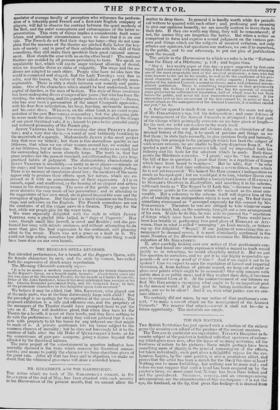MR. GREATOREX AND THE HARMONICON.
THE notice which we took of Mr. GREATOREX-S concert, in the SPECTATOR of the 2nd of May, has been attacked with such severity in the Harmonicon of the present month, that we cannot allow the matter to drop there. In general it is hardly worth while for periodi- cal writers to quarrel with each other ; and, professing and meaning to give our opinions honestly, we are usually content to leave them to their fate. If they are worth any thing, they will be remembered; if not, the sooner they are forgotten the better. But when a writer so competent to form and express a sound judgment on the various per- sons and things which are the subjects of musical criticism, not only attacks our opinions, but questions our motives, we owe it to ourselves, to the public, and to our adversary, to put our plea of justification upon the record.
The article in the Harmonicon to which we refer is in the "Extracts from the Diary of a Dilettante," p. 139 ; and begins thus.
" May 2. In a weekly paper of this day—a paper supported by first-rate talent, and conducted with great ability, I tind with regret an article attacking, one of the most respectable men of the musical profession ; a man who has done honour to his art by his talents, as well as by the excellence of his per- sonal character, and promoted it in his public capacity ; I mean the con- ductor of the Ancient Concert, a sound musician, and a well-informed accom- plished gentleman. There is something ungenerous in thus gratuitously wounding the feelings of an individual who has for upwards of seventy years preserved an unblemished reputation, half of which time he has been before the public, and never till now encountered a public enemy. If the reproaches cast on him on account of his last concert be, in point of fact, a covert attack on the management of the Ancient Concerts, it is neither candid nor just," &c. &c.
A further appeal is made from our opinion, on the score not only of Mr. GREATOREX'S age, but his indisposition ; and some defence of the management of the Ancient Concerts is attempted : but that part. of the charge which principally concerns us we have given at length— for the rest, we refer our readers to the work itself.
Now we conceive our plain and obvious duty, as chroniclers of the musical history of the day, is to speak of persons and things as we find them ; to state facts correctly, to give opinions freely and honestly_ Applying this principle to the paragraph which has been the subject of such severe censure, we are unable to find any departure from it. We quoted a part of Mr. GREATOREX'S bill, and we impeached both his industry and his taste for the selection which lie made. Both these points the Dilettante concedes. " I grant," says he, "tire demerits of the bill of fare in question : 1 grant that there is a repetition of things which have been heard to weariness." But he adds, that " he who drew it up was at that time suffering from a severe illness, from which he is not yet recovered." We lament Mr. GREATOREX'S indisposition as much as his apologist ; but we would put it to him, whether illness can be admitted as a plea for appending a harpsichord lesson of HANDEL'S to MOZART'S Overture to ZaubmyThlte, and inserting it in his scheme, with such trash as " The Sequel to 0 Lady fair.l'—because these were the precise points in the scheme which we noticed as the most cen- surable. But a reference to the scheme itself will deprive him of the plea of inability from indisposition which is now set up. We find there something announced as " arranged expressly for this concert by Mr. GREATOREX." Therefore lie was not obliged to take whatever came first to his hand, but, on the contrary, brought out a new arrangement of his own. If able to do this, he was able to prevent the " repetition of things which have been heard to weariness." There would have been less trouble in performing two good glees of HORSLEY or ATT- WOOD, than in what is called "arranging " an Irish melody, or tinker- ing up the delightful " Sequel." If our judgment concerning this ar- rangement be deemed severe, it is most abundantly confirmed in the same Number of the Harmonicon which contains the Dilettante's ex- culpation of Mr. GREATOREX.
lf, after carefully looking over our notice of that gentleman:s con- cert, we had found one single expression which a regard to truth would justify us in retracting, we would cheerfully retract it. But we put this question to ourselves, and we putt it to our highly respectable op-
ponent—Is not erery word of it true And if so, ought it not to be spoken ? Can we expect to earn the reputation of honest and impartial historians, if, from feelings of private regard, we keep out of sight or gloss over points which ought to be censured? Our only concern with public men is as public men ; and if they neglect their duty, it becomes ours to remind them of it. At the commencement of our labours we find Mr. GREATOREX occupying what ought to be an important post in the musical world : if in that post he betray inattention or inca- pacity, are we to be silent ? And if so, with what justice can we cen- sure others ?
We certainly did not mean, by our notice of that gentleman's con- cert, " to make a covert attack on the management of the Ancient Concerts." We reserve that attack—covert it shall not be—for a future opportunity. The materials are ample.


















 Previous page
Previous page